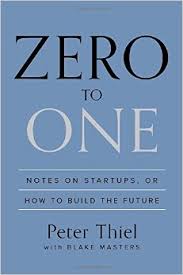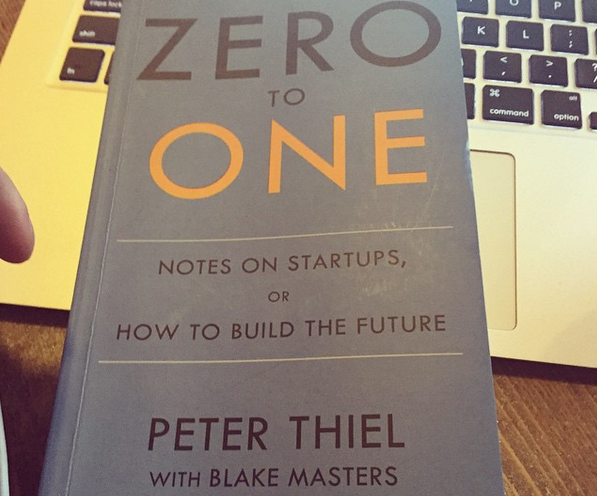Like most people, I came to know Peter Thiel’s name after watching The Social Network, the movie about how Facebook was founded. Peter Thiel was one of the initial investors in the website, and as a result, is now a billionaire.
His new book, Zero to One: Notes on Startups, was born out of a course Thiel taught about startups at Stanford in 2012. It covers his experience building PayPal, Palantir, and investing in hundreds of startups from Facebook to SpaceX.
Coming from an economics background, a lot of what Thiel had to say really resonated with me. For example, he underscored that there are two types of economic progress: horizontal (copying what works) and vertical (coming up with new things).
Horizontal vs. Vertical Progress.
Horizontal progress is usually caused by adopting new technologies that exist in other countries, adding more capital (machines on the factory floor), or adding more labor (people).
China and Japan are both good examples of countries that adopted Western technology at one point, which fueled rapid economic growth in a relatively short amount of time. By simply adopting the best technologies that already existed to increase per-worker output, they experienced near double digit year-on-year growth.
A lot of people wonder why the United States experiences slower economic growth than China. The reason is that the United States must innovate, if it wants to increase per-worker productivity. This means inventing new technologies that will allow workers to do more with less. These are examples of “vertical progress.”
Going from 0 to 1
Going from 0 to 1 is an example of vertical progress. Essentially, it’s when you “jump a curve” in technology. Instead of making a faster, lighter, or more comfortable horse carriage, you invent a car. Instead of making a new PC operating system, you create a touch-based tablet interface.
The one point that I really like that I hadn’t thought about before was Thiel’s take on first vs last movers.
“It’s must better to be the last mover- that is, to make the last great development in a specific market and enjoy years or even decades of monopoly profits.” – Zero to One: Notes on Startups
Although it’s still yet to be proven true, I think Facebook is an example of a last-mover, but not a first mover. There were many other social networks when Facebook launched, yet they managed to rise to the top and connect the world.
Another example of a “last-mover” is Google, which is likely to be the last web-based search engine. They were not the first mover. Other search engines existed at the time, but it’s pretty clear now that they have solved the problem so well that someone else who enters search will do it in a completely different way in the future.
Competition vs. Monopoly
“If you want to create and capture lasting value, don’t build an undifferentiated commodity business.” – Zero to One: Notes on Startups
In economics in college, I was taught that competitive markets are good and that monopolies are bad. Thiel takes an interesting side on this argument, saying that starting a company that is undifferentiated in a competitive industry is a bad idea because all of the profits will be competed away.
It’s better to try to create a monopoly business, as this is the best route for accumulating capital. You can do this by creating proprietary technology, using economics of scale, network effects, or having superior branding. In technology, usually monopoly businesses are replaced by new monopoly businesses, that have jumped a technology curve.
I agree with Thiel that our society puts so much emphasis on competition. Things that people compete for are perceived to have a high value moreso than things that we don’t compete for.
The competition to become the best lawyer or to be a top academic is fierce! Through sports and early education we’re taught that we should strive to compete and win, in order to stand out.
Successful startups take a completely different point of view. Rather than competing, they strive to find “hidden value” and start their own game, rather than competing in someone else’s.
A good example of this is AirBnB. Rather than trying to build up a hotel empire and compete with Hilton, they created an entirely new way of thinking about overnight stays and as a result, have become a billion dollar startup company.
Thoughts on Secrets
“You can’t find secrets without looking for them.” – Zero to One: Notes on Startups
According to Thiel, there are two kinds of secrets: secrets about nature, and those about people.
I think a secret about nature (aside from scientific discoveries) could also be classified as coming up with a new technology or putting together the parts better than other people, like the touch-screen interface in smartphones.
Secrets about people are what I think many startups are founded around. Who thought that millions of people would be willing to rent out a spare bedroom in their apartment to a stranger? AirBnB discovered this secret about human nature and has capitalized on it.
Sometimes, as an entrepreneur, I view myself as a scientist, sociologist, or psychologist. I will conduct studies, observe the results, and use those results to draw conclusions about human nature at a given point in time. Those conclusions can lead to new product ideas or services.
The important thing to realize is that human nature, societal behavior, and technology change over time. White americans might not have been willing to buy traditionally black cultural music in the 1900s, but now a days rap and hip hop is super popular and lucrative.
Keeping an eye on observing how human nature and technology changes over time can lead to openings for new startup ideas! Who could predict that we would be taking photos of our food and ourselves in 2015? Way back, you wouldn’t take a photo of your food, have it printed at a local CVS, and then give it to a friend, but that’s exactly what you’re doing on the social web!
Concluding Thoughts
 I was really glad I read this book! I’ll definitely be checking out more talks Peter Thiel has given and start following his career. I was surprised by how philosophical he was in Zero to One. Yes, there was a lot of practical information, but he also went off on tangents some time. However, they were interesting.
I was really glad I read this book! I’ll definitely be checking out more talks Peter Thiel has given and start following his career. I was surprised by how philosophical he was in Zero to One. Yes, there was a lot of practical information, but he also went off on tangents some time. However, they were interesting.
Let me know what you thought of this book in a comment below! I’d love to hear your thoughts and whether or not you agree with me on some of the points I’ve made above.

I loved the book as well 🙂
So much so I’ve extracted the main nuggets out of it.
You can find them here:
http://www.getnugget.co/zero-to-one-nuggets-from-peter-thiels-bestselling-book/